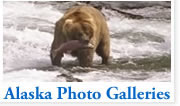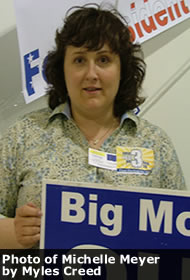
 |
 |
May 27, 2008
Clean Elections Initiative Could Become Law in 2008, Then Vanish in 2010Commentary by John CreedA "Clean Elections" initiative, the result of a statewide voter petition drive that ended this past January, will appear on Alaska's Aug. 26 primary ballot. 
If approved by voters, this new law will allow candidates to choose to run for state elective office using public funds-as long as candidates pledge to forego private campaign contributions. The Clean Elections ballot initiative is designed to drive out the big money that has been corrupting government in Alaska for years, as one politico after another has landed in prison over the past year-with more likely to follow. Supporters are cautiously optimistic that Alaska voters will approve the Clean Elections initiative in August. Nevertheless, Clean Elections backers worry that big money from outside the state may fill opposition coffers and fuel a massive summer ad campaign that could defeat the measure. Even if opposition money from wealthy Outside donors doesn't materialize this summer, and even if the Clean Elections initiative passes handily in August, an even bigger threat to cleaning up political campaigns hangs over Alaska. Earlier this year, backers of another-and completely separate-ballot initiative gathered enough signatures to appear on the 2010 ballot. If voters approve this so-called "Anti-Corruption" initiative, it would wipe out the new Clean Elections law (assuming Clean Elections passes in August). That means Alaskans face a rocky road in their quest to clean up one of the nation's most politically scandalous states: Alaskans are being investigated, indicted, tried, convicted, and sent to prison for political corruption crimes to include fraud, conspiracy and bribery in connection with the oil industry and other corporate interests. With the current disreputable focus on Alaska, one thing is certain: Alaskans from across the political spectrum are fed up, indeed outraged, as revelations continue to cascade into the public eye about crimes the state's politicos have been committing behind closed doors for years. In fact, the state's Clean Elections movement today enjoys broad bi-partisan support, ranging from former Democratic Gov. Tony Knowles to former Gov. Wally Hickel, a Republican. State legislators in both parties as well as Gov. Sarah Palin, a conservative Republican, also support the Clean Elections initiative. With the public's trust in elected officials so shattered these days in Alaska, it may not be wise to oppose Clean Elections, although some legislators nevertheless have voiced their opposition, and publicly, including Rep. Bob Roses, R-Anchorage. "I don't think the Alaska public is as concerned with who the contributors are as much as they are concerned about who is trying to hide contributions and why they are hiding them," Roses wrote in an Anchorage Daily News commentary last year. But Hickel, also a former Interior Secretary, later pointed out that the Clean Elections model "is being used in seven other states and has reduced the stranglehold incumbents and special interests can apply to the democratic process. The cynics say that money is the golden rule of politics. Let's prove them wrong." Those seven states Hickel refers to include Arizona, a Republican stronghold that has elected Gov. Janet Napalitano twice as a Clean Elections candidate. In Maine, which is more favorable to Democrats, Clean Elections candidates are campaigning more on public policy issues rather than spending hours sidling up to special interests in search of private cash to run their campaigns. Polls show that Clean Elections laws remain popular in every state that's used publicly financed election campaigns for several election cycles. Polling in Alaska also shows strong support for the Clean Elections concept. In fact, much of Alaska's opposition to Clean Elections, such as the Anti-Corruption ballot initiative, appears to be funded largely by Outside money, although those money sources are difficult to track. Clean Elections proponents say it's easier to hide funding sources from Outside donors for initiative campaigns-either for or against-than for actual candidate campaign contributions. Anti-Corruption Initiative Could Ace Out Clean ElectionsAt first glance, at least some of the "Anti-Corruption" initiative, which gathered enough voter signatures in Alaska earlier this year to qualify for the 2010 statewide ballot, sounds like good government at work. For example, the Anti-Corruption initiative would prohibit individuals from leaving elective office to then go directly into securing a government contract. So far so good, right? The Anti-Corruption initiative also would ban government contractors from contributing to political campaigns. Who could be against that except special interests seeking undue influence, correct? But here's the rub: The Anti-Corruption initiative also would ban all public money from funding political campaigns. Bingo! That means a successful Anti-Corruption ballot initiative in 2010 would wipe out the 2008 Clean Elections ballot initiative (assuming Clean Elections passes this August). Clean Elections supporters have found themselves fighting battles on several fronts these days. For example, they must win over voters to pass their own Clean Elections measure in August. Then, instead of working with a single focus to implement the Clean Elections law (assuming it passes) for the 2010 election cycle, Alaskans who want to drive big money out of state politics instead will be working simultaneously to defeat 2010's Anti-Corruption initiative. If voters approve the Anti-Corruption ballot initiative, the Clean Elections law will go away before it ever would get a chance to work in Alaska. In other states, Clean Elections legislation has taken several election cycles before, say, 80 percent of all candidates run publicly funded campaigns and people-powered democracy starts to take hold and moneyed interests loosen their grip as government returns to of, by and for the people. Alaskans Fight BackMichelle Meyer, campaign manager for Alaskans for Clean Elections, the main group pushing for publicly funded political campaigns in Alaska, is encouraged that most Alaskans have overwhelmingly embraced publicly funded political campaigns. But Meyer also realizes the obstacles the Clean Elections initiative faces over the next several months and years. With that in mind, her organization set up a booth at the Alaska Democratic Convention in Palmer over the Memorial Day weekend. "I believe Clean Elections is the most important thing we need to consider politically in Alaska," she said. "I don't think enough Alaskans realize how uncertain the road is to cleaning up political corruption in this state." Many Alaskans believe that if voters reject Clean Elections under the current political climate, campaign finance reform of this magnitude may never happen in Alaska-ever. In other states, Clean Elections laws have been spurred largely in the wake of political corruption. (Ironically, in Alaska the Clean Elections initiative coordinators began organizing well before the latest political scandals broke, but the movement is riding a wave of popularity that Alaska's political corruption has no doubt cultivated.) Although Alaska swims in political corruption these days, well-heeled special interests are still trying to thwart efforts to bring participatory democracy closer to the people. Real Estate Magnate Covertly Funds InitiativesFor decades a reclusive New Yorker and wealthy real estate magnate named Howie Rich has been funneling millions of dollars into initiative campaigns aimed at limiting state government, primarily in Western states. One front group linked to Rich, a former long-time and influential member of the Libertarian Party, is called Americans for Limited Government. There is evidence Rich is backing Alaska's 2010 Anti-Corruption ballot initiative. The media-shy Rich, who is in his late 60s, works hard to fly under the radar, filtering his money through a complex array of channels in an attempt to keep his activities out of the public eye. In the age of the Internet, of course, covert political activities are becoming increasingly difficult. A website titled "Howie Rich from New York City" also has a catchy subtitle: "How a Real Estate Tycoon is Secretly Trying to Influence Your State Government." The website says the public knows little about where Rich moves his money or how Howie's money could end up changing state laws all over the country. Here's the Rich website: howierichexposed.com Loose initiative campaign finance laws too often assist Rich's efforts to remain anonymous, although he also thumbs his nose at government and even the rule of law, said Meyer of Alaskans for Clean Elections, adding that Rich uses his wealth to set up "Astroturf" organizations posing as grassroots groups to push his anti-government causes. Working in the shadows, Rich makes it difficult for the groups he targets to respond to his covert activities. But some journalists have done outstanding work exposing Rich and his clandestine projects. In 2006, for example, Ray Ring, an editor for High Country News, won a George Polk Award, one of journalism's most prestigious prizes for investigative journalism. Ring's prize-winning piece was an exhaustively researched investigation called " Taking Liberties." "Ring's work exposed Rich's consistent pattern of breaking laws and funneling New York money into Western states," reports Howierichexposed.com. "Most of the initiatives were defeated, either at the ballot box or in court." Outside Money Nevertheless Could Defeat Clean Elections in AlaskaCash-strapped, people-powered grassroots movements similar to the Clean Elections initiative, according to Meyer, have failed in the past after wealthy donors have financed stealth opposition media campaigns using distorted, incomplete, and even outright false information to hoodwink unsuspecting voters. Because of Rich's secrecy, Alaskans for Clean Elections officials at this point can only speculate whether Rich may funnel money this summer into Alaska to defeat the Clean Elections ballot measure in August, or whether he'll wait for an all-out push to pass the Anti-Corruption initiative in 2010. Scott Kohlhaas, a Libertarian Party activist and perennial candidate for elective office in Alaska, worked on the Alaska Anti-Corruption signature drive earlier this year. Dick Randolph, a Fairbanks insurance salesman and former gubernatorial candidate, told the Anchorage Daily News in January that Rich had contacted him about supporting Alaska's Anti-Corruption initiative campaign. Randolph agreed to lend his name to the effort. Bob Adney, who spearheaded Alaska's Anti-Corruption signature campaign, will likely continue to push the Anti-Corruption initiative so voters will approve it in 2010, says Meyer, as part of a complex array of under-the-radar organizing activities. "It's scary that this is so elaborate," said Meyer, adding that Adney is not an Alaskan but a hired gun from Outside. "By comparison, the Clean Elections initiative is entirely grassroots, entirely Alaskan-driven," she said. Some Alaskans have charged that the Anti-Corruption signature gatherers were misleading voters by inaccurately tying their initiative to Clean Elections. Some voters have filed formal letters of complaint about such tactics to the lieutenant governor's office, Meyer said, including Sheila Selkregg, vice chair of the Anchorage Municipal Assembly. The lieutenant governor oversees elections in Alaska. Alaskans for Clean Elections, in the spirit of transparency for all political campaigns, has disclosed all funding sources and far beyond campaign finance legal requirements, according to Meyer. Press reports indicate Anti-Corruption initiative backers have not been similarly forthcoming about their funding sources, either inside Alaska or from the Lower 48, which leaves voting public with few tools to detect the real backers' identities. Also, how can voters hope to distinguish between the two groups, when Anti-Corruption's initiative parasitically piggybacks on the momentum of Clean Elections, muddying the waters? Democracy only works when the citizenry is both informed and engaged. Let's hope fellow Alaskans will see through this charade. © AlaskaReport - All Rights Reserved. John Creed is a humanities/journalism professor at Chukchi College, the Kotzebue branch of the University of Alaska Fairbanks. Myles Creed just completed his freshman year at Lewis & Clark College in Portland, Oregon. Email them at zfjc@uaf.edu and mcreed@lclark.edu. |
|